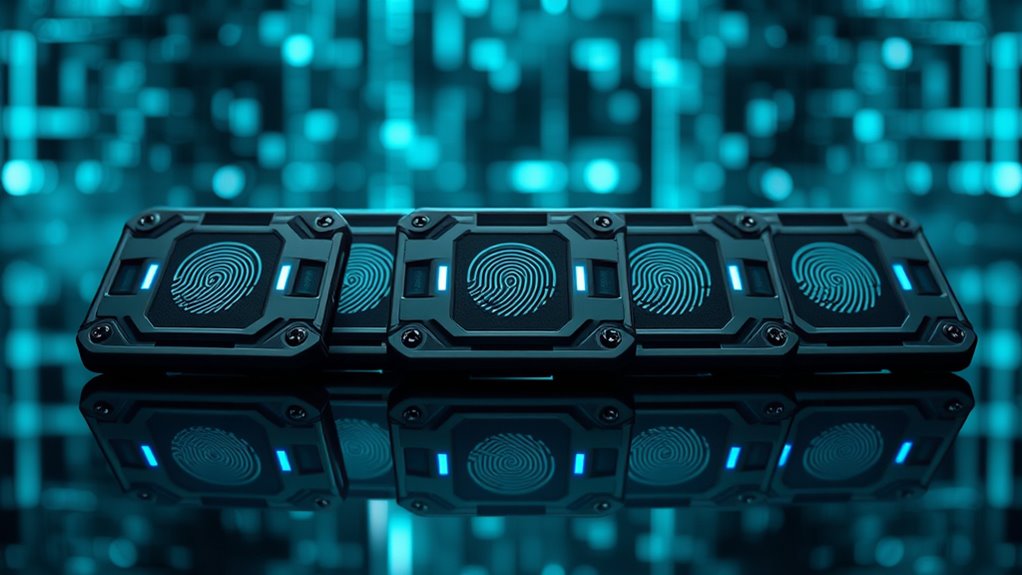If you’re looking for the top biometric crypto hardware wallets for maximum security in 2025, I recommend checking out models like Trezor Safe 3, Ledger Nano S Plus, and DCENT. They feature industry-leading certifications like EAL6+ secure elements, biometric authentication, tamper-resistant designs, and support for thousands of assets. Many also offer Bluetooth, NFC, and offline options for added convenience. Stick with me to find out which wallet fits your needs best and how they safeguard your crypto assets.
Key Takeaways
- Top biometric crypto wallets feature industry-leading security certifications like EAL6+ and EAL5+ for tamper resistance and offline protection.
- Many utilize secure elements, encrypted stainless steel seed backups, and tamper-resistant designs to safeguard private keys.
- Design aspects such as rugged build, tamper-proof materials, and high-resolution screens enhance durability and user confidence.
- Connectivity options include USB-C, Bluetooth, NFC, and QR code signing, balancing convenience with security.
- Support for extensive assets and cross-platform compatibility ensures comprehensive, secure crypto management in 2025.
Trezor Safe 3 Crypto Hardware Wallet
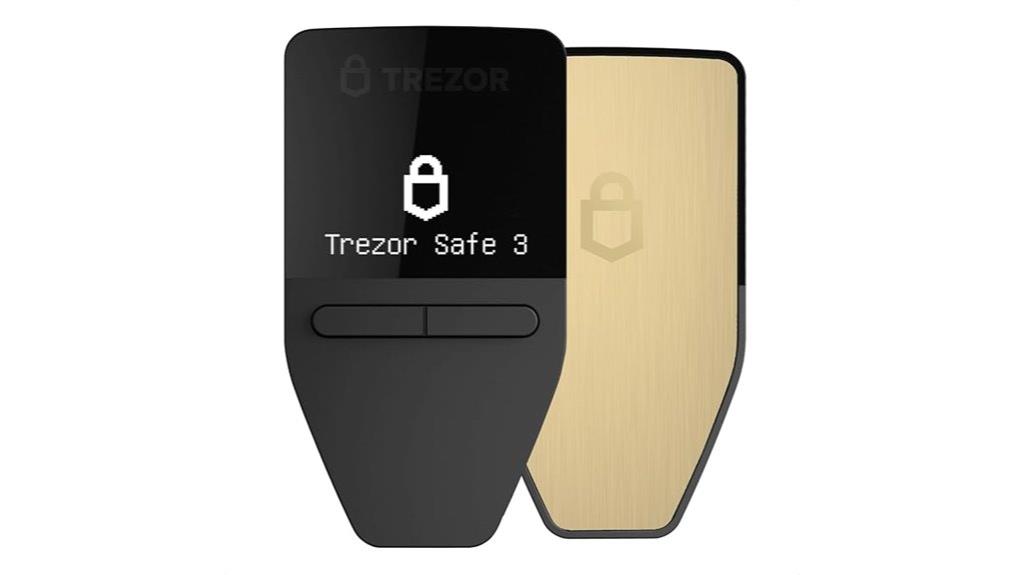
If you’re looking for a highly secure hardware wallet that combines portability with advanced protection, the Trezor Safe 3 is an excellent choice. Its compact, lightweight design, with a durable aluminum and plastic build in Solar Gold, makes it easy to carry. The device features a clear OLED screen for on-device transaction confirmations, a USB-C control interface, and push buttons for smooth operation. Water-resistant and without a built-in battery, it connects to a computer or power source. With its robust security features like an NDA-free EAL 6+ Secure Element and open-source firmware, the Trezor Safe 3 guarantees your crypto assets are protected against threats.
Best For: users seeking a highly secure, portable hardware wallet for managing a wide range of cryptocurrencies with advanced protection features.
Pros:
- Compact, lightweight design with durable materials for portability
- Advanced security including NDA-free EAL 6+ Secure Element and open-source firmware
- User-friendly interface with on-device transaction confirmations and seamless management via Trezor Suite
Cons:
- No built-in battery, requiring connection to a computer or power source
- Small font size on the OLED screen may be challenging for some users, especially older individuals
- Setup and backup procedures, such as passphrase management, can be complex for beginners
Ledger Nano S Plus (Gold) Hardware Wallet for Crypto & NFTs
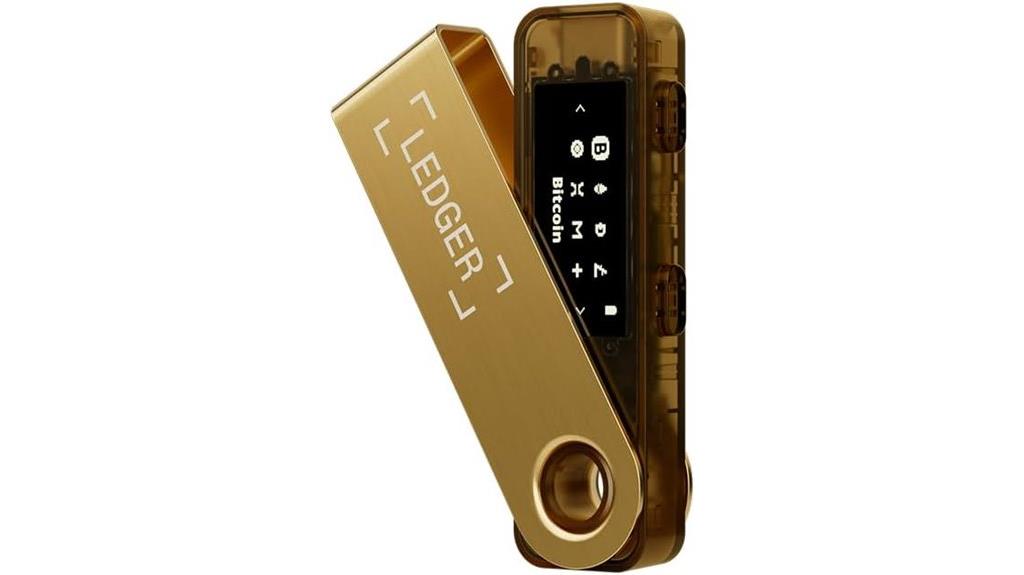
The Ledger Nano S Plus (Gold) hardware wallet stands out as an excellent choice for both beginners and experienced users who want secure, straightforward management of cryptocurrencies and NFTs. Its compact design and 1.09-inch screen make it easy to navigate, while supporting thousands of coins, including Bitcoin, Ethereum, and NFTs. With a certified secure chip, private keys stay offline, ensuring top-tier security. Compatible with desktop and Android via Ledger Live, it offers a simple interface, though it relies on USB-C and lacks wireless options. Overall, it’s a reliable, durable, and cost-effective cold wallet that emphasizes self-custody and asset protection.
Best For: beginners and experienced crypto users seeking a secure, straightforward hardware wallet for managing a wide range of cryptocurrencies and NFTs with reliable offline protection.
Pros:
- Easy to set up and use, with a clear, simple interface suitable for all levels
- High security with a certified secure chip and offline private key storage
- Compact and portable design, making it convenient for on-the-go management
Cons:
- Lacks wireless connectivity, relying solely on USB-C connection
- Small screen and no touchscreen may limit ease of navigation for some users
- Basic functionality without advanced features or customization options
DCENT Hardware Wallet – Biometric Cold Crypto Wallet with Fingerprint Authentication

The DCENT Hardware Wallet stands out as an ideal choice for serious crypto users prioritizing top-tier security combined with biometric convenience. It features a certified EAL5+ Secure Element chip and advanced fingerprint authentication, encrypting private keys offline and eliminating the need for PINs. Fingerprint data stays securely within the device, preventing leaks, while Bluetooth encryption guarantees safe wireless connections. Supporting over 3,900 coins across 80+ blockchains, it offers a user-friendly interface with a bright display and intuitive controls. Seamless mobile connectivity via Bluetooth allows effortless asset management, swaps, and Web3 access, making it a reliable, compact, and highly secure crypto solution.
Best For: serious crypto enthusiasts and security-conscious users seeking biometric protection and comprehensive asset management across multiple blockchains.
Pros:
- Industry-leading security with certified EAL5+ Secure Element chip and biometric authentication
- Supports over 3,900 coins across 80+ blockchains for versatile portfolio management
- Seamless Bluetooth connectivity with easy mobile access for swaps, Web3, and NFT interactions
Cons:
- Interface and customer support may be less user-friendly compared to some competitors
- Higher price point relative to basic hardware wallets
- Some users may find setup or firmware updates slightly complex initially
Bitcoin Hardware Wallet

A Bitcoin hardware wallet like Bitkey is ideal for users who prioritize simplicity, security, and modern design in managing their digital assets. I appreciate its sleek look combined with NFC technology for quick, secure transaction confirmation. Its unique three-key approach replaces traditional seed phrases, reducing user error and safeguarding my Bitcoin. The intuitive app makes managing my holdings easy, letting me compare prices across major exchanges like Coinbase and Cash App. Created by the team behind Square and Cash App, Bitkey offers a trusted, user-centric experience. It seamlessly integrates with exchanges, ensuring my Bitcoin remains protected while I buy, sell, or transfer with confidence.
Best For: users seeking a sleek, secure, and user-friendly Bitcoin hardware wallet with modern design and seamless exchange integration.
Pros:
- Simplifies security with a unique three-key approach, eliminating the need for seed phrases
- Features NFC technology for quick and secure transaction confirmation without Bluetooth vulnerabilities
- Easy-to-use app for managing Bitcoin, comparing prices, and tracking wallet value over time
Cons:
- May have a higher price point compared to basic hardware wallets due to premium design and features
- Limited to Bitcoin, lacking multi-cryptocurrency support that some users might desire
- Dependence on NFC technology could pose compatibility issues with certain devices or environments
Arculus Crypto Cold Storage Wallet
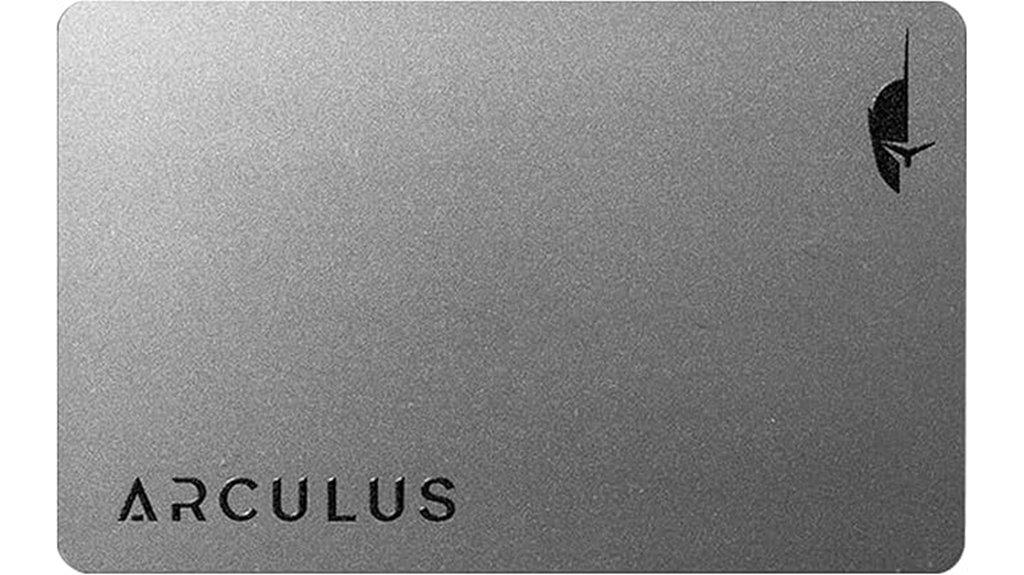
If you’re looking for a secure, portable cold storage solution that combines advanced biometric authentication with user-friendly management, the Arculus Crypto Cold Storage Wallet is an excellent choice. It supports major cryptocurrencies like Bitcoin, Ethereum, and more, using a 3-factor authentication system—biometric lock, PIN, and private key encryption on a metal card. Its NFC technology allows contactless transactions without internet or power, enhancing security and convenience. The slim, credit-card design makes it easy to carry, and managing assets through the app is straightforward. While some encounter NFC pairing issues, overall, it offers robust security and ease of use for anyone serious about crypto safekeeping.
Best For: those seeking a secure, portable cold storage solution for major cryptocurrencies with easy management and advanced biometric security.
Pros:
- Supports 95% of the market, including Bitcoin, Ethereum, and more, making it highly versatile.
- Features a robust 3-factor authentication system with biometric lock, PIN, and private key encryption for enhanced security.
- Contactless NFC technology allows secure transactions without internet or power, increasing convenience and safety.
Cons:
- NFC pairing can sometimes be unreliable, especially with phone cases or interference.
- Firmware updates are limited, and newer firmware may require purchasing a new device, raising concerns about obsolescence.
- Moving assets out of the wallet involves network and transaction fees, which can be costly and inconvenient.
Ultra Secure Crypto Hardware Wallet (2 Pack)
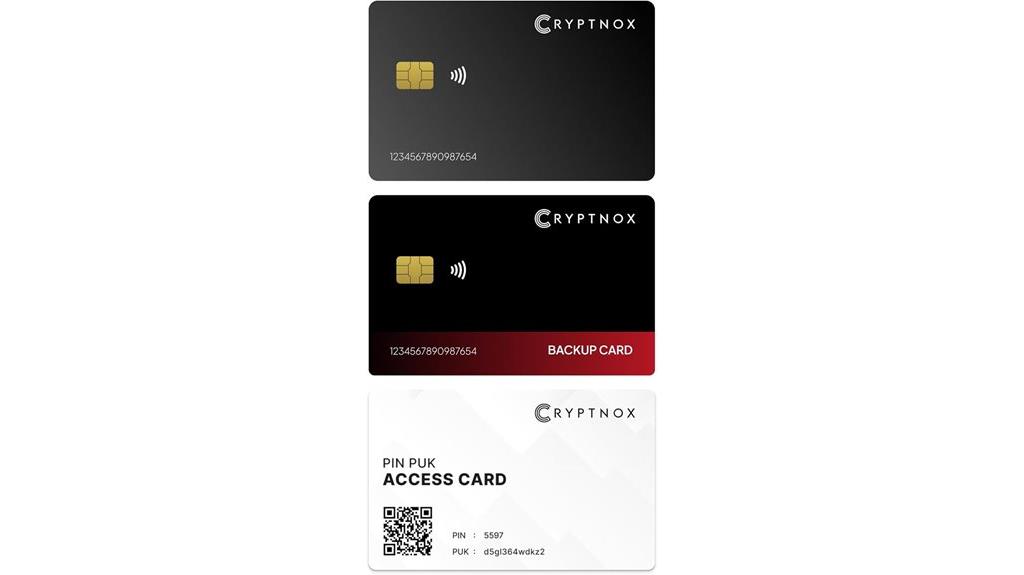
For anyone seeking high-level security with ease of access, the Cryptnox Ultra Secure Crypto Hardware Wallet (2 Pack) stands out as an excellent choice. These compact, tamper-resistant cards support Bitcoin, Ethereum, NFTs, and more, with certified EAL6+ secure elements and encrypted NFC. They feature biometric pairing, a built-in FIDO2 passkey, and two-factor authentication, ensuring strong protection. Compatible with platforms like Binance and Coinbase, they allow offline signing via tap-to-sign, keeping private keys secure. While setup can be tricky and NFC reliability varies, especially on iOS, this pack offers solid backup security for everyday use and travel at an affordable price.
Best For: users seeking affordable, portable, and high-security backup options for managing small amounts of cryptocurrency and digital assets on the go.
Pros:
- Certified EAL6+ secure elements and encrypted NFC provide strong security features.
- Compact, tamper-resistant design similar to a smartcard makes it portable and durable.
- Supports multiple platforms and blockchains, facilitating versatile crypto management.
Cons:
- NFC reliability can be inconsistent, especially on iOS devices, affecting ease of use.
- Setup instructions may be unclear, requiring reinitialization if cards are moved prematurely.
- Limited support for large sums or complex crypto needs; better suited for casual or backup security.
ELLIPAL Titan 2.0 Crypto Cold Wallet, Offline & Secure
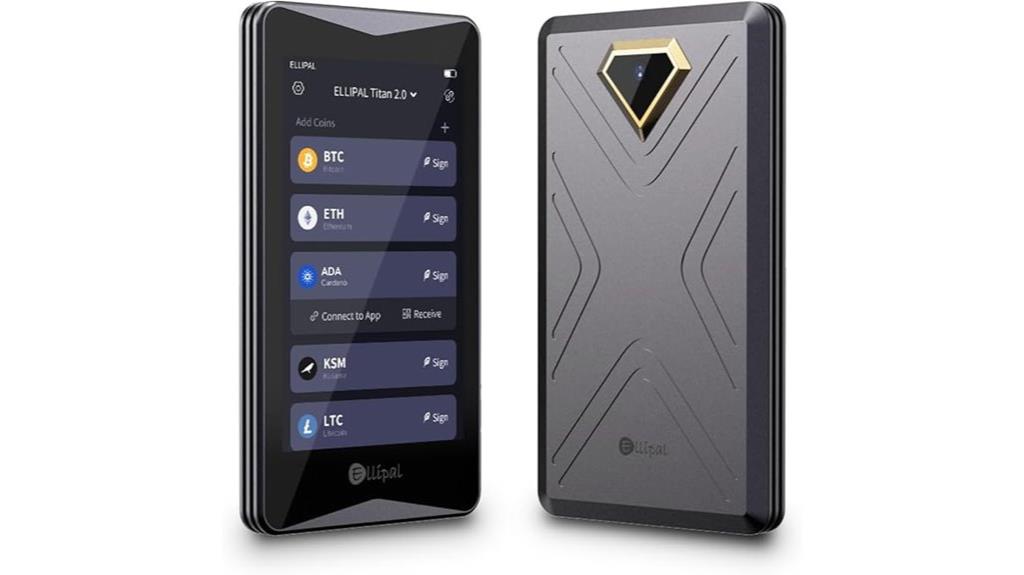
The ELLIPAL Titan 2.0 Crypto Cold Wallet stands out as an ideal choice for crypto users who prioritize maximum security and offline storage. Its air-gapped, fully offline design with no WiFi, Bluetooth, or USB connections guarantees protection against remote attacks. Transactions are conducted via QR codes, safeguarding private keys. The device features a CC EAL5+ certified secure element, supports extensive seed phrases, and includes anti-tamper and self-destruct mechanisms. Built from durable metal with a 4-inch touchscreen, it offers intuitive operation. Despite some firmware update challenges, it remains a top-tier option for those seeking a physically secure, offline hardware wallet.
Best For: crypto enthusiasts and security-conscious users seeking a highly secure, offline hardware wallet for long-term crypto storage.
Pros:
- Air-gapped, fully offline design with no internet connectivity, ensuring maximum security against remote attacks.
- Durable metal construction with a responsive 4-inch touchscreen for intuitive use and physical robustness.
- Supports extensive seed phrases, multiple accounts, and integrates with the Ellipal app for managing thousands of cryptocurrencies and NFTs.
Cons:
- Firmware updates can be lengthy and sometimes challenging, requiring reformatting MicroSD cards and multiple attempts.
- MicroSD card compatibility issues and occasional difficulties with accessories like the docking station.
- Mixed customer support experiences, with some users reporting difficulties in obtaining timely assistance.
Wallet Pack of 2 – Secure Crypto Wallet
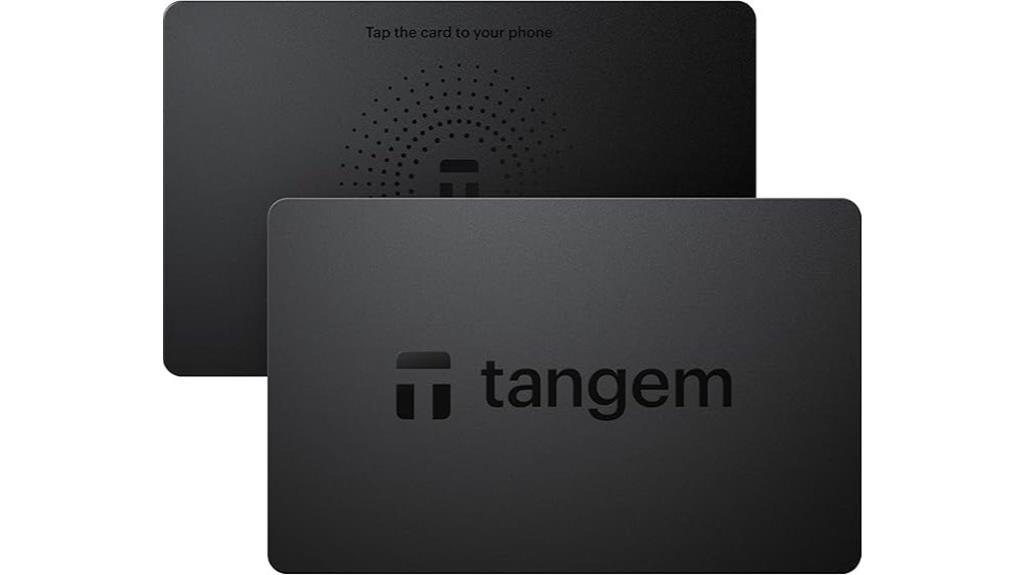
A Wallet Pack of 2 – Secure Crypto Wallet is the perfect choice for anyone who wants reliable, high-security storage for their digital assets. It features private keys generated and stored exclusively on the card, never leaving it, which shields it from hackers. Certified with EAL6+, the highest industry standard, and audited by Kudelski Security and Riscure, it guarantees top-tier security. Supporting over 13,000 tokens across 70+ blockchains, it’s compatible with Bitcoin, Ethereum, NFTs, and DeFi. No wires or batteries are needed—just a smartphone and NFC tap. Its durability, backed by IP68 protection, ensures it withstands environmental challenges for up to 25 years.
Best For: individuals seeking a highly secure, durable, and user-friendly hardware wallet for managing a wide range of cryptocurrencies across multiple blockchains.
Pros:
- Industry-leading security with private keys stored exclusively on the card and certified with EAL6+
- Supports over 13,000 tokens across 70+ blockchains, including Bitcoin, Ethereum, NFTs, and DeFi
- No wires, batteries, or seed phrases needed; operates easily via NFC with smartphone compatibility
Cons:
- Limited to NFC-enabled smartphones; not compatible with devices lacking NFC support
- Requires a smartphone for operation, which may be inconvenient for some users preferring traditional hardware wallets
- Bulkier than some traditional hardware wallets due to the all-in-one card design
SecuX Shield Bio Crypto Hardware Wallet
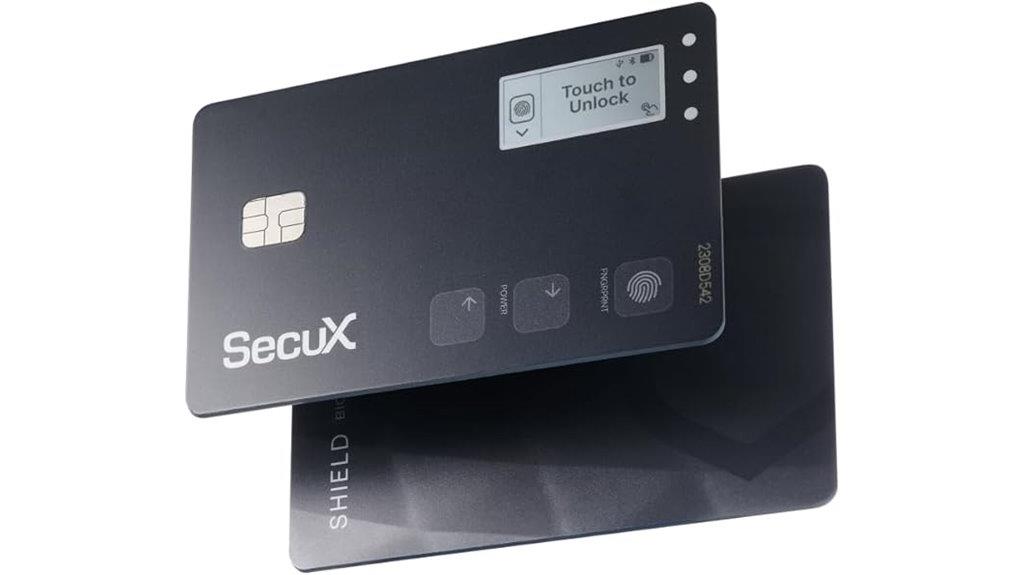
If you’re seeking a compact crypto wallet that combines biometric security with convenient portability, the SecuX Shield Bio Crypto Hardware Wallet is an excellent choice. Its credit card-sized design makes it easy to carry, and biometric fingerprint authentication adds an extra security layer. The device connects securely via encrypted Bluetooth and features a clear display for transaction verification. It supports a wide range of coins like Bitcoin and Ethereum, with seamless integration with apps like MetaMask. Setup is straightforward, though some users find managing it challenging. Overall, it offers robust security features, making it ideal for serious crypto users who want portability without sacrificing protection.
Best For: serious cryptocurrency users seeking a portable, secure hardware wallet with biometric authentication and broad coin support.
Pros:
- Compact, credit card-sized design for easy portability and storage
- Advanced security features including biometric fingerprint authentication and encrypted Bluetooth connectivity
- Supports a wide range of coins and tokens, with seamless app integrations like MetaMask
Cons:
- Setup and management can be challenging for less tech-savvy users
- Connectivity issues such as Bluetooth disconnections requiring troubleshooting or app reinstallation
- Limited support for some coins like Cardano and Solana, with ongoing updates needed
Ledger Nano S Plus Hardware Wallet for Crypto and NFTs
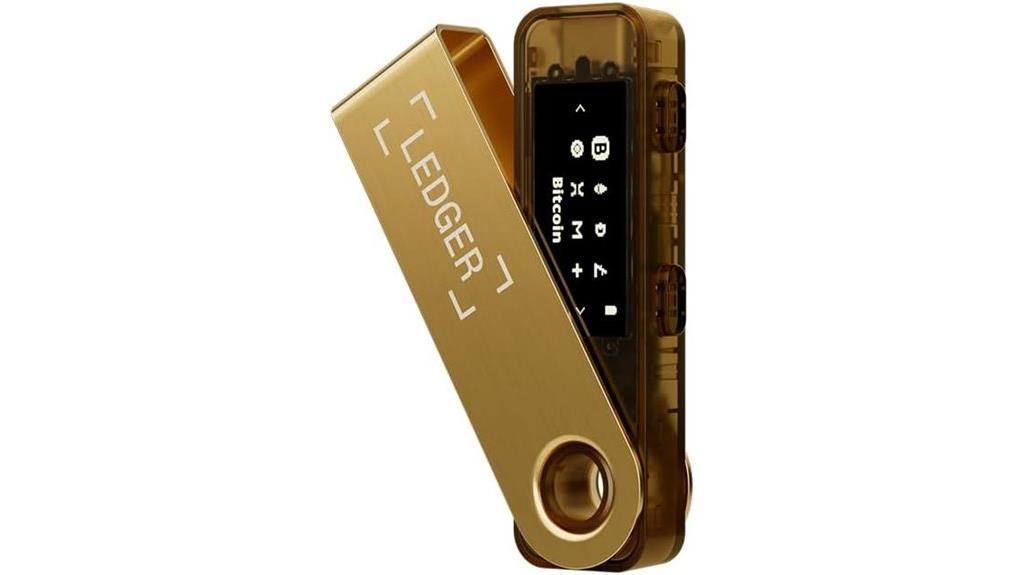
For those seeking a secure, easy-to-use hardware wallet for managing cryptocurrencies and NFTs, the Ledger Nano S Plus stands out as a solid choice. It features a compact design with a 1.09-inch screen, supporting thousands of coins, including Bitcoin, Ethereum, and NFTs, via Ledger Live. Its secure chip keeps private keys offline, ensuring maximum protection. While it lacks wireless connectivity and has a small display, users appreciate its straightforward setup, durability, and affordability. Compatible with desktop and Android, it’s ideal for both beginners and experienced users looking for reliable cold storage. Overall, the Nano S Plus combines security and simplicity in a portable package.
Best For: those seeking a secure, affordable, and easy-to-use hardware wallet for managing cryptocurrencies and NFTs, suitable for both beginners and experienced users.
Pros:
- Compact, portable design with a 1.09-inch screen for easy on-the-go management
- Strong security features with a certified secure chip and offline private keys
- Supports thousands of coins and NFTs via Ledger Live, offering versatile asset management
Cons:
- Lacks wireless connectivity, requiring a USB-C cable for connection
- Small screen and absence of a touchscreen may limit ease of use during transactions
- Basic functionality without advanced features found in higher-end hardware wallets
SecuX V20 Crypto Hardware Wallet with Bluetooth & NFT Support

The SecuX V20 Crypto Hardware Wallet stands out for those who prioritize both security and convenience, thanks to its Bluetooth connectivity that allows seamless management of digital assets without cumbersome cables. It features a tamper-resistant packaging, a secure element certified to CC EAL 5+ standards, and a rugged aluminum case for durability. Supporting a wide range of cryptocurrencies, including Bitcoin, Ethereum, and tokens like ERC20 and BSC, it also offers NFT management. Its cross-platform compatibility makes it easy to control assets across devices, while its sturdy build ensures long-term protection. Overall, the V20 combines robust security with user-friendly features, making it an excellent choice for crypto enthusiasts in 2025.
Best For: crypto enthusiasts seeking a durable, secure, and versatile hardware wallet with Bluetooth connectivity and NFT support for seamless management across devices.
Pros:
- Provides comprehensive security features including tamper-resistant packaging and a CC EAL 5+ certified secure element
- Supports a wide range of cryptocurrencies and tokens, including NFTs, for versatile asset management
- Cross-platform compatibility and Bluetooth connectivity offer convenience and ease of use
Cons:
- May be relatively expensive compared to basic hardware wallets
- Bluetooth connectivity could pose potential security concerns if not properly managed
- Rugged design and advanced features might be overwhelming for beginners new to crypto hardware wallets
Ledger Nano X Hardware Wallet
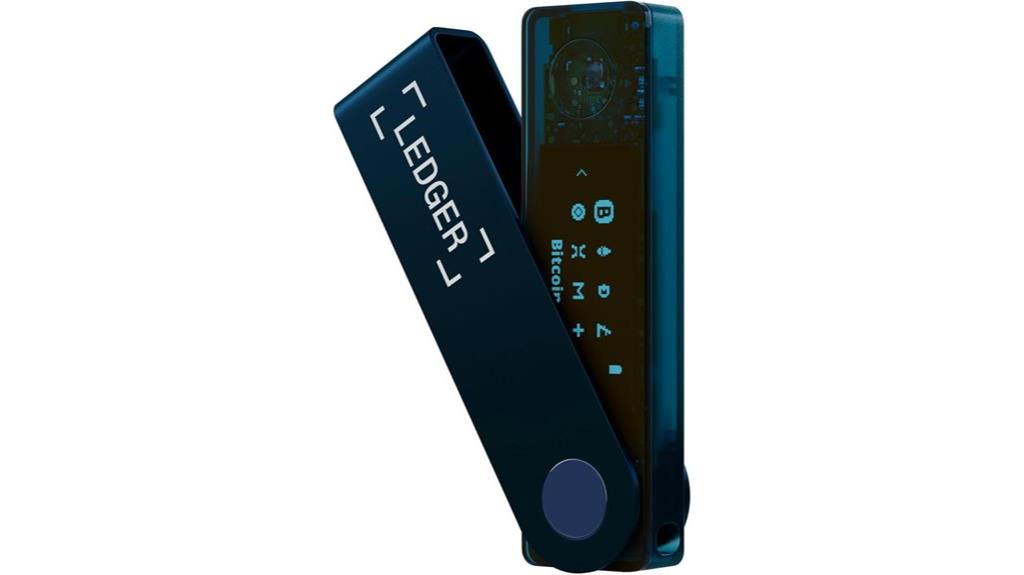
The Ledger Nano X hardware wallet stands out as a top choice for users seeking secure, portable management of a wide range of cryptocurrencies. It features Bluetooth connectivity, a certified secure chip, and supports thousands of digital assets, including Bitcoin and Ethereum. The device is compact, stylish, and easy to carry, with a user-friendly Ledger Live app for quick access to crypto and dApps. Setup involves creating a PIN and backing up seed phrases, though managing multiple assets can be tedious. Bluetooth connectivity offers convenience but may face pairing issues, and battery life can be limited during frequent Bluetooth use. Overall, it’s a versatile, secure option for crypto enthusiasts.
Best For: crypto enthusiasts and investors seeking a secure, portable hardware wallet with versatile asset support and mobile connectivity.
Pros:
- Supports thousands of cryptocurrencies and NFTs with easy app management via Ledger Live.
- Certified secure chip and PIN/seed backup for strong security measures.
- Compact, stylish design with Bluetooth functionality for on-the-go access.
Cons:
- Bluetooth connectivity can be inconsistent, leading to pairing issues and frustration.
- Battery life may be limited during frequent Bluetooth use, requiring frequent recharging.
- Setup process, especially seed phrase entry and managing multiple assets, can be tedious and time-consuming.
Trezor Safe 3 Crypto Hardware Wallet
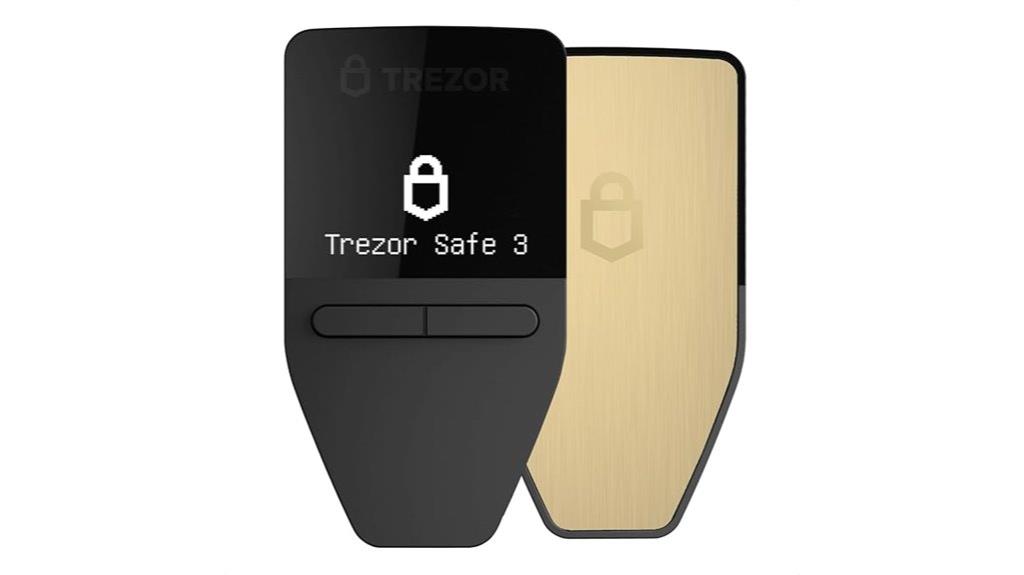
If you’re seeking a highly secure hardware wallet that emphasizes physical protection, the Trezor Safe 3 is an excellent choice, especially since it features an NDA-free EAL 6+ Secure Element. Its compact, lightweight design, with a durable aluminum and plastic build in Solar Gold, makes it highly portable. The OLED screen allows for on-device transaction confirmation, and the USB-C interface ensures quick, secure connections. With advanced security features like passphrase encryption, multi-share backups, and open-source firmware, it guards against phishing, malware, and tampering. Perfect for users prioritizing security, the Trezor Safe 3 offers a straightforward setup and seamless management of thousands of cryptocurrencies.
Best For: users seeking a highly secure, portable hardware wallet with advanced physical protection and open-source transparency for managing diverse cryptocurrencies.
Pros:
- Robust security features with NDA-free EAL 6+ Secure Element and passphrase encryption
- Compact, lightweight design in durable Solar Gold, highly portable for on-the-go use
- Supports thousands of cryptocurrencies with seamless management via Trezor Suite app
Cons:
- Small font size on the OLED screen can be difficult for some users, especially older individuals
- No built-in battery, requiring connection to a computer or power source during use
- Passphrase setup may be complex for beginners unfamiliar with advanced security options
COMBO – ZERO Crypto Hardware Wallet & GRAPHENE Ultimate Backup

For security-conscious crypto users who prioritize offline protection and robust backup options, the COMBO – ZERO Crypto Hardware Wallet paired with the GRAPHENE Ultimate Backup offers an ideal solution. This device features a 4-inch touchscreen, managing assets like Bitcoin, Ethereum, tokens, and NFTs via the NGRAVE LIQUID app. It signs transactions through QR codes, keeping private keys offline. Its stainless steel casing is dustproof, water-resistant, and tamper-proof, with a biometric lock for extra security. The GRAPHENE backup system creates a split, encrypted stainless steel seed phrase, making recovery highly secure. Designed for long-term cold storage, it combines elegance, durability, and maximum protection.
Best For: security-conscious crypto users seeking offline asset management, advanced backup options, and durable, tamper-proof storage solutions.
Pros:
- Robust security features including CC EAL7 OS, secure element chip, and tamper-proof casing with data wipe sensors.
- High-security backup system with split, encrypted stainless steel plates for seed phrase recovery.
- User-friendly 4-inch touchscreen and seamless management of multiple assets via the NGRAVE LIQUID app.
Cons:
- Quick battery drain makes it less suitable for frequent, on-the-go transactions.
- Not water-resistant, requiring careful handling in wet environments.
- Higher price point due to premium security features and durable construction.
Ledger Nano X Crypto Hardware Wallet, Bluetooth

When managing multiple cryptocurrencies securely on the go, Ledger Nano X stands out thanks to its Bluetooth connectivity, which allows seamless pairing with mobile devices. I find this feature convenient for managing assets without cables, especially when using the Ledger Live app to access crypto services and dApps. The device’s secure chip keeps private keys offline, ensuring strong security. Despite its compact design and portability, I’ve experienced some Bluetooth pairing challenges, particularly with certain Android phones. Still, the Nano X’s support for a broad range of coins and NFTs makes it a versatile choice for serious crypto users seeking maximum security and mobility.
Best For: serious cryptocurrency investors seeking secure, portable, and versatile management of a wide range of digital assets with convenient Bluetooth connectivity.
Pros:
- High security with a certified secure chip and offline private keys
- Supports managing NFTs and thousands of cryptocurrencies, including Bitcoin and Ethereum
- Wireless Bluetooth connection for managing assets on the go via mobile devices
Cons:
- Bluetooth pairing can be challenging and may experience connectivity issues, especially with certain Android phones
- Battery life is limited, draining quickly during use
- Setup can be tedious, requiring careful handling of seed words and navigation of dual buttons
Factors to Consider When Choosing Biometric Crypto Hardware Wallets
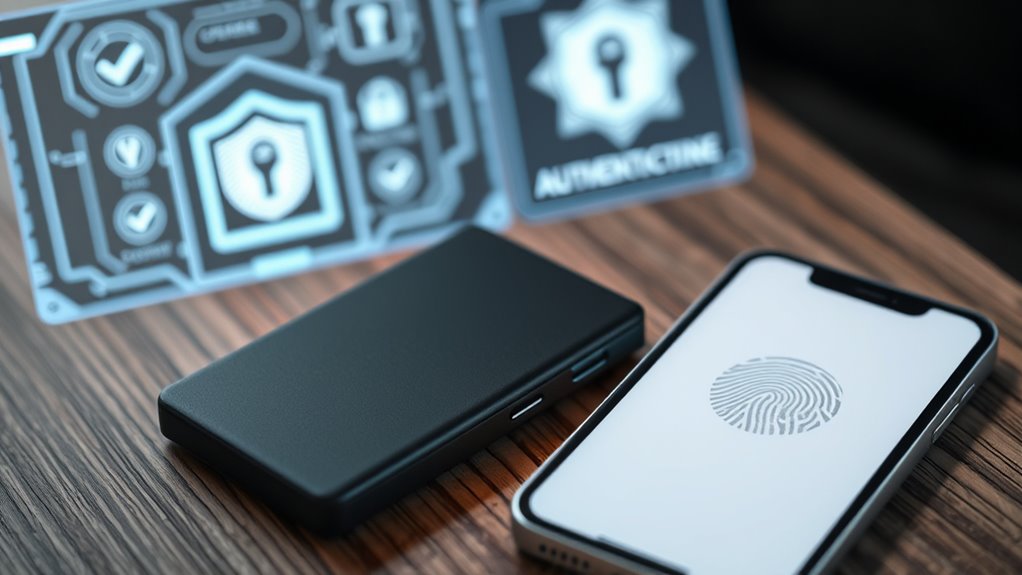
When selecting a biometric crypto hardware wallet, I look at several key factors to guarantee it meets my needs. I consider the security strength of the biometrics, how well it works with my assets, and how easy it is to set up. Additionally, I evaluate the device’s durability and connectivity options to find a reliable, user-friendly solution.
Biometric Security Strength
Choosing a biometric crypto hardware wallet requires careful consideration of the security strength offered by its biometric features. The key is how well the wallet can verify your identity securely and resist spoofing attempts. High-quality sensors, such as those with certified secure elements like CC EAL5+ or EAL6+, drastically improve protection against counterfeiting and tampering. Biometric data, including fingerprints or facial scans, is stored locally within the device, ensuring your sensitive information isn’t transmitted or exposed externally. This enhances privacy and reduces vulnerability. When combined with multi-factor security measures like PINs and hardware encryption, biometric features create a formidable barrier against both physical and digital attacks. Ultimately, the strength of biometric security hinges on the device’s hardware quality and robust encryption methods.
Compatibility With Assets
Biometric security features can protect your assets effectively, but ensuring compatibility with your specific cryptocurrencies is equally important. You need to verify that the hardware wallet supports the tokens and coins you plan to store, like Bitcoin, Ethereum, or NFTs. Check if the device’s firmware and software are regularly updated to stay compatible with new asset types and blockchain networks. It’s also essential that the wallet can handle multiple assets simultaneously through a single interface, making portfolio management easier. Additionally, confirm whether it supports the latest standards, such as ERC-20 tokens or Solana, to avoid outdated coin compatibility. Ultimately, consider if the wallet integrates smoothly with your preferred third-party platforms or apps, ensuring seamless transactions and asset management.
Ease of Setup
A smooth and simple setup process is essential for getting your biometric crypto wallet up and running quickly and confidently. I look for devices that can be initialized in under 15 minutes, with clear, step-by-step instructions for pairing biometric features, PINs, and security measures. The easier the setup, the less likely I am to make errors or get frustrated. Compatibility with mobile apps or desktop software that guide me through each step makes the process even more straightforward. Quick pairing methods like NFC tap or Bluetooth are a big plus, as they eliminate the need for multiple cables or complicated procedures. Ultimately, a user-friendly setup minimizes technical hurdles, making the wallet accessible for both beginners and experienced users alike.
Device Durability
Durability is a crucial factor when selecting biometric crypto hardware wallets, especially since these devices often go wherever you do. A robust wallet should be built from high-quality materials like stainless steel, aluminum, or reinforced plastics to resist physical damage. Tamper-resistant or tamper-evident packaging adds an extra layer of security against unauthorized access. Environmental factors such as water, dust, and shocks can compromise a device’s reliability, so resistance to these elements is indispensable for long-term use. A rugged build ensures the wallet can endure drops, impacts, and everyday wear, maintaining the integrity of your private keys. Certifications like IP68 or military-grade standards are good indicators of enhanced durability, giving you peace of mind that your wallet can withstand harsh conditions without compromising security.
Connectivity Options
When choosing a crypto hardware wallet, the way it connects to your devices can considerably impact both convenience and security. Wireless options like Bluetooth and NFC offer quick, hands-free management of your assets, making transactions more seamless. Bluetooth allows for wireless communication but can pose security risks if not properly encrypted or if pairing processes are weak. NFC enables tap-and-go transactions, adding convenience, but compatibility depends on your device’s NFC hardware and supporting apps. On the other hand, wired connections like USB-C or USB-A provide a more secure and reliable link, though they sacrifice some flexibility. Your choice should balance ease of use with security needs, ensuring the connection method aligns with your device ecosystem and risk appetite.
Backup and Recovery
Choosing a biometric crypto hardware wallet hinges not only on its security features but also on how well it supports backup and recovery options. A dependable wallet offers secure backup methods like multi-share or encrypted recovery systems, ensuring you can restore your assets if the device is lost or damaged. Effective recovery options often include seed phrases, seedless backups, or encrypted backup plates, which should be stored offline to prevent theft. Some wallets incorporate biometric authentication as an additional fallback, enabling access via fingerprint or facial recognition if other methods fail. When selecting a wallet, check if it supports multiple backup formats or multi-device recovery, giving flexibility for different security needs. A robust system should be tamper-proof, resistant to physical damage, and have straightforward procedures for restoring access without compromising security.
User Interface Clarity
A clear and well-designed user interface is essential when selecting a biometric crypto hardware wallet, as it directly impacts how easily you can manage your assets and security features. A straightforward interface ensures transaction details, device status, and security prompts are visible and easy to understand at a glance, reducing confusion. Intuitive navigation with well-organized menus and prompts minimizes user errors during setup, transfers, or updates. High-contrast displays and legible fonts enhance readability in different lighting conditions and for users with visual impairments. Simplified, step-by-step processes help users confidently complete complex tasks without frustration. Consistent visual cues and clear labels further improve overall usability, especially for those who aren’t highly tech-savvy, making security management more accessible and less error-prone.
Price and Value
How much you pay for a biometric crypto wallet substantially impacts the security and features you receive. Basic models start around $30, while premium options can cost over $200, reflecting added security and advanced features like certified secure elements and biometric authentication. Investing in a higher-priced wallet often provides better protection, which is vital for serious investors. When evaluating value, consider not just the initial cost but also security benefits, ease of use, and compatibility with your assets. Some wallets offer bundled backup systems or multi-pack discounts, boosting value if managing multiple assets. Striking a balance between cost and security is key—spending more upfront can reduce risks of theft or loss, ultimately saving time, money, and hassle over the long term.
Frequently Asked Questions
How Do Biometric Features Enhance Crypto Wallet Security?
Biometric features greatly boost crypto wallet security by ensuring only authorized users can access it. I find that fingerprint scans or facial recognition add an extra layer of protection beyond passwords or PINs. This makes it nearly impossible for someone else to gain access to my wallet, even if they steal my device. Biometric authentication provides a quick, secure, and user-friendly way to safeguard my digital assets from unauthorized access.
Are Biometric Wallets Vulnerable to Fingerprint Spoofing?
Think of biometric security as a fortress guarding treasure; yet, even the strongest walls can be breached. I know fingerprint spoofing can sometimes trick sensors, like a false key opening locked doors. While advancements reduce these risks, no system is foolproof. I stay cautious, combining biometric features with other security layers. Remember, in this digital vault, vigilance is your best shield against vulnerabilities like fingerprint spoofing.
What Authentication Methods Complement Biometric Security?
When considering authentication methods that complement biometric security, I believe multi-factor authentication (MFA) is key. Combining biometrics with PIN codes, passwords, or security tokens creates multiple barriers for hackers. I also recommend using hardware security modules (HSMs) for added protection. By layering these methods, I can guarantee my crypto assets stay secure, even if one layer is compromised. This approach provides peace of mind and robust defense against potential threats.
How Is Biometric Data Stored Securely on Hardware Wallets?
Imagine a vault with a fingerprint scanner—biometric data is stored securely on hardware wallets just like that. I’ve seen how manufacturers encrypt this data, keeping it isolated from other system parts. Additionally, they often use secure elements or Trusted Platform Modules (TPMs) to protect your biometric info. This way, even if someone hacks the device, they can’t access your sensitive biometric data, ensuring maximum security.
Can Biometric Wallets Recover Access After Fingerprint Damage?
If your fingerprint gets damaged, most biometric wallets have backup options like PINs or passcodes to regain access. I always recommend setting up these alternatives during setup. That way, even if biometric data becomes unusable, you won’t be locked out. It’s a smart move to ensure you can recover your crypto assets safely without relying solely on fingerprint recognition.
Conclusion
Choosing a biometric crypto hardware wallet is like finding a needle in a haystack, but with the right info, you can make a smart choice. These devices offer first-rate security and peace of mind for your digital assets. Remember, a chain is only as strong as its weakest link, so invest in a reputable wallet. Stay vigilant, stay secure, and keep your crypto safe—because an ounce of prevention is worth a pound of cure.

